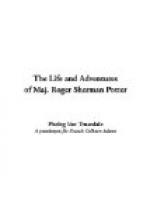A stage of rough planks was erected during the night just abaft the fore-mast, and over this a mizen topgallant studding-sail formed an awning, between which and the mast there was a huge wind-sail, leading down into the forehatch. The fore-courser and lower studding-sails were now clewed up, and a messenger dispatched to inform the general and his secretary that the ship was crossing the line, and as Neptune’s temper was crispy of age, he might on discovering any want of respect, invoke a storm. Not content with this, two officers high in rank rushed into the state-room of Mr. Tickler, and evincing great anxiety lest his reputation for courage suffer, drew him from his berth, and winding him up in a sheet, bore him struggling in their arms to a seat arranged on the platform. At the same time a great blowing of sea-conchs (said to be Neptune’s chorus), accompanied by the heaving and splashing of waters, was heard directly under the bows, and was indeed enough to strike terror into a stronger heart than Tickler possessed. In short, the secretary found his courage giving out, notwithstanding he had on the evening previous given several of the officers a most interesting account of the many duels he had figured in. In truth, it must be confessed that if the secretary had not been secured to his seat with gaskets, he would, regardless of precedents, have taken to his heels and left the ceremony to those who had a liking for it. And as it was, his fears continued to increase with the approach of the ceremony.
A double file of men, in their neatest attire, now formed in order from the orlop to the fore-chains. At this moment the general, arrayed in his war-worn uniform, sallied forth with becoming dignity, and evidently much concerned about the important part he was to play in this great event, for he felt in his heart that the honor of his country depended entirely upon the skill he displayed in riding the flying horse. He was also not a little concerned lest his secretary should fail to carry himself with becoming nerve, and encouraged him with promises to permit him to say things creditable to himself in his first letter to the New York Daily Discoverer.
Old Neptune, trident in hand, and as fishy an old salt as could well be imagined, now rose with great gravity and stateliness over the bow; and having cast a piercing glance at the file of men, who raised their hats and saluted him with becoming deference, advanced slowly, and being met by two senior lieutenants, was first informed of the great fame of the voyagers, and then welcomed on board with a speech. This done he was introduced to, and exchanged courtesies with the general, who made him sundry bows, and would have put many questions to him concerning his ancestry; but as it was customary with him to lose no time, he proceeded forthwith to the shaving. Perhaps I ought here to inform the reader that this Neptune wore a sort of toga, made of the skins of sea-lions;




